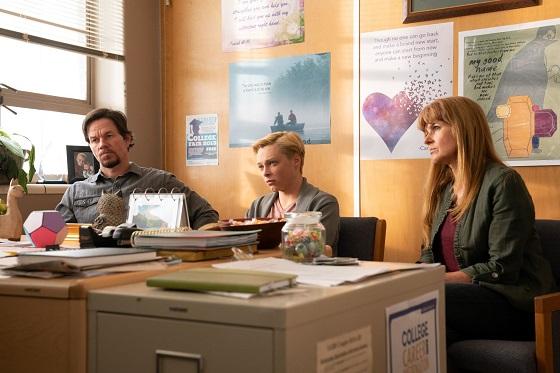

[Rating: Minor Rock Fist Down]
In theaters July 23
A jumbled, scattered mess of good intentions and unfocused storytelling, Joe Bell, much like its eponymous character, just kind of wanders. The true story of a father who undertook a walking journey from Oregon to New York to raise awareness about bullying, the film (and even its own characters) struggle to give meaning or purpose to what transpires through its lean 85-minute runtime. At times a meditation on fatherhood, tolerance, forgiveness, and the terror of adolescence, Joe Bell tries to be a Jack of all trades, yet is ultimately a master of none.
The movie opens in media res, with Joe Bell (Mark Wahlberg) giving a stilted, uncomfortable talk to a packed high school auditorium. It’s May 2013, and Joe explains that he is walking across America to spread the word about bullying and its potentially dire consequences. Once back on the road, Joe engages in a running verbal battle with his son, Jadin (Reid Miller), who inspired the journey and is constantly reminding his dad that Joe can do (and be) better. A flashback to Oregon nine months before brings the audience up to speed on how Joe got on the road in the first place, and how his struggle to sympathize and support Jadin through a particularly rough couple of weeks set the current events in motion.
A gay and “out” teenager in a small town, Jadin suffers terribly at the hands of his school’s bullies and finds little support from administrators and even his dad: both of whom indirectly imply that the kid is bringing the abuse on himself. Although Jadin’s mother, Lola Bell (Connie Britton), and his siblings/friends are there for the young man, it’s just not enough to sustain him. By the end of the first act, the film reveals that Jadin took his own life, and Joe’s conversations with him on the road nine months later are a way for the devastated father to work through his grief.

If Joe Bell had retained this as its emotional and narrative through-line, it might have been able to sustain itself within an arena that only takes Joe’s failings as a father into account, yet the movie keeps reaching. Along the way, there’s a swerve to take a look at how Jadin’s suicide has impacted Joe and Lola’s marriage (and the latter’s growing drinking problem), and another about what it means to forgive, and yet another about Joe’s struggle to separate his own insecurities and ego from Jadin’s story. At times, Joe is resolute about walking every step of his journey, yet at others he seems to be on the verge of quitting (with his family also taking turns between wanting him back and encouraging him to finish).
It’s enough to make one’s head spin, and while any of these issues (even the contradictory ones) might have been worth exploring, Joe Bell seems happy just skimming the surface without adequately confronting any of them. This skimming is also something the characters have to battle, as no one aside from Joe develops or stands out all that much in the picture. Even Jadin, the person around which all of this drama revolves, is less a fully realized character and more a cudgel the movie uses to emotionally pulverize his father. Lola drifts in and out of the picture without all that much to do, along with her other two children, with all three serving as little more than framing devices for Joe’s ambling and soul-searching. What these characters do or say amount to little in Joe’s overall journey, begging the question of what they’re even doing in the film in the first place.
Visually, it doesn’t get much better. Director Reinaldo Marcus Green has some gorgeous landscapes at his disposal (Joe’s walk features stretches of Idaho, Utah, and Colorado), yet none of these locales gets featured in a way that takes advantage of their beauty and grandeur. This is ostensibly a road movie, yet nothing about it gives it a sense of place either in the United States or the west, nor does it tie in with Joe’s journey in a way that connects the emotional core of the experience with the physical nature of the trip.

To his credit, Wahlberg does a fine job holding the film together with his rotating wheel of emotional roulette. Utterly gutted by Jadin’s death, and in the midst of a mini breakdown both before and after he starts his walk, Joe is a tangle of very legitimate and understandable emotions. A good man deep down, albeit with a temper and prejudicial streak set into the foundation of his soul, Joe is an accurate reflection of a particular subset of people who are tolerant up to the point where it infringes on their carefully manicured comfort levels. Although the script forces Wahlberg to take some odd detours with the character (one involving his other son in a motel bathroom in particular), he keeps the performance grounded, and sells it well.
As Joe gets closer to some peace about his son’s passing and the role he played in it, he says, “What I come to know is that I been walking to try and figure out why my son did what he did … I should have known all along, but instead I just, I just made Jadin being gay all about Joe Bell. About me. Not about my boy.” It’s a great moment for the movie and the actor, yet it underscores the biggest problem of Joe Bell: it’s following the wrong person. In Jadin, the movie has a true hero, one courageous and bold and special enough to celebrate; in Joe, the film has a jumbled mess of emotions and contradictions, none of them particularly interesting or fully baked. Kudos to Wahlberg for making it all somewhat believable and identifiable, but next time make the movie about the kid.





Comments on this entry are closed.